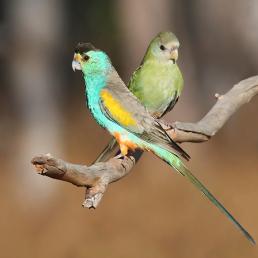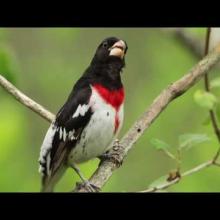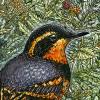

Join BirdNote tomorrow, November 30th!
Illustrator David Sibley and actor H. Jon Benjamin will face off in the bird illustration battle of the century during BirdNote's Year-end Celebration and Auction!
In summer, many shrubs bear fruit that birds find irresistible. Elderberries, serviceberries, blackberries, dogwood berries, mulberries, and currants attract many species of birds, including waxwings, tanagers, robins, warblers and this Rose-breasted Grosbeak. Plants offer this bounty in exchange for birds’ help in distributing their seeds. And in dispersing pollen, birds, bats and insects also help to guarantee a new crop of berries!
BirdNote®
Fruit as a Bribe
Written by Bob Sundstrom
This is BirdNote.
[Rose-breasted Grosbeak song]
By mid-summer, many shrubs that in May shone boldly with flowers are now bearing fruit – fruit that birds find irresistible. Elderberries, serviceberries, blackberries, dogwood berries, mulberries, currants, and dozens of others. Waxwings, tanagers, robins, grosbeaks – even tiny warblers – feast on nature’s bounty.
[Rose-breasted Grosbeak song]
We might think that plants are being generous by offering such a rich supply of nutritious fruits. In truth, something other than largesse is at work here. Plants evolved fruits as a kind of bribe, a way of enticing mobile creatures like birds to ingest their seeds. Birds then excrete those seeds hours later, as they move widely about the landscape. Plants themselves take no metabolic benefit from the sweet pulp of their fruits. Instead, they offer this bounty in exchange for birds’ help in distributing their seedlings in new locations.
Flowering plants also, rely on winged animals for pollination.
[Wing sound and call of Ruby-throated Hummingbird]
And in dispersing pollen, birds, bats and insects also help guarantee a new crop of berries: those brightly hued reminders of mutual benefit – the co-evolution between plants and animals. [Song of Rose-breasted Grosbeak]
For BirdNote, I’m Mary McCann.
###
Bird sounds provided by The Macaulay Library of Natural Sounds at the Cornell Lab of Ornithology, Ithaca, New York. Song of Rose-breasted Grosbeak [84866] recorded by W.L. Hershberger; wing beat and call of Ruby-throated Hummingbird [6116] by R.S. Little.
BirdNote’s theme music was composed and played by Nancy Rumbel and John Kessler.
Producer: John Kessler
Executive Producer: Chris Peterson
© 2014 Tune In to Nature.org July 2014/2019 August 2023
Narrator: Mary McCann
ID# fruit-01-2019-7-7 fruit-01
[key reference for this script was a chapter in Steve Hilty’s Birds of Tropical America entitled “Fruit of the Land: Birds, Fruit and Seed Dispersal”. Chapters Publishing Co., 1994.]
Articles on what berries birds like:
http://www.mnn.com/your-home/organic-farming-gardening/stories/10-berri…
https://www.birdsandblooms.com/gardening/top-10-lists-for-gardeners/top…







